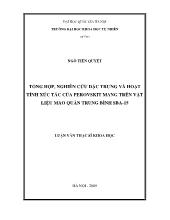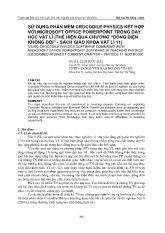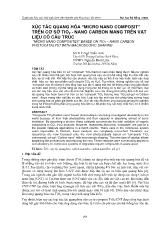Synthesis and characterization of carbon supported pt and pt alloy nanoparticles as electrocatalysts material for proton exchange membrane fuel cell
- Người chia sẻ : vtlong
- Số trang : 22 trang
- Lượt xem : 20
- Lượt tải : 500
- Tất cả luận văn được sưu tầm từ nhiều nguồn, chúng tôi không chịu trách nhiệm bản quyền nếu bạn sử dụng vào mục đích thương mại
Bạn đang xem trước 20 trang tài liệu Synthesis and characterization of carbon supported pt and pt alloy nanoparticles as electrocatalysts material for proton exchange membrane fuel cell, để xem tài liệu hoàn chỉnh bạn click vào nút DOWNLOAD LUẬN VĂN ở trên
Proton exchange membrane fuel cell (PEMFC), a potential
renewable energy source in the near future, has been considerablely
studied in the world. The advantages of the PEMFCs are low
temperature operation, high conversion efficiency, fast startup, low
temperature operation (100°C), flexible power scalee and
particularly friendly environment. The application of PEMFC
focuses on three main areas: transportation, power supply for
residential areas and power for portable electronic devices.
Platinum is the ideal catalyst material for PEMFC due to its
high catalytic activity for hydrogen oxidation (HOR) and oxygen
reduction (ORR) reactions as well as high stability in low pH
environments at cathode. However, Pt is precious and expensive, so
the use of this material will greatly increase the cost of PEMFC. This
is one of the major challenges that limit the commercialization of
PEMFCs in the world.
To reduce the Pt metallic catalyst content, development of
nanotechnology has played an important role with research of
dispersing Pt metallic particles on carbon supports. To disperse
catalyst nano-particles means that the catalyst surface area is
increased. In some reports, this area may reach to approcimately 120
m2/g. As a result, the activity of the catalyst material has been
significantly improved and Pt metallic loading might dropped to 0.4
mg/cm2 while PEMFC properties change insignificantly.




